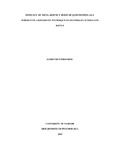Efficacy of meta-adjunct mode of questioning as a formative assessment technique in secondary schools in Kenya
| dc.contributor.author | Okou, James M | |
| dc.date.accessioned | 2016-04-22T05:35:58Z | |
| dc.date.available | 2016-04-22T05:35:58Z | |
| dc.date.issued | 2015 | |
| dc.identifier.uri | http://hdl.handle.net/11295/94712 | |
| dc.description.abstract | The purpose of this study was to investigate the effect of meta-adjunct questioning on students’ academic attainment. To accomplish this purpose, three smaller objectives were addressed. The objectives were: (a) To determine if meta-adjunct mode of questioning has an effect on academic attainment of low and high achieving students; (b) To determine if the effect of meta-adjunct mode of questioning on academic attainment depends on student gender, (c) To determine the if effect of meta-adjunct mode of questioning on academic attainment depends on students’ academic performance. The research was guided by both quantitative and qualitative approach. The sample was secondary school students in form III. The data was collected using a “meta-cognitive test” to establish higher order thinking. Secondary data was collected from students’ academic scores from teachers progress reports on classroom based formative assessment. The data was analyzed using paired raters as well as MANOVA statistics. The results showed that student learning across all types of learners does not reflect meta-cognitive abilities. There was a difference in that lower achievers compared to high achievers showed differences in meta-cognitive abilities. Recommendation is made that teachers should be trained in meta-adjunct questioning skill so as to further enhance learning of meta-cognitive abilities across learners of all types. | en_US |
| dc.language.iso | en | en_US |
| dc.publisher | University of Nairobi | en_US |
| dc.subject | Efficacy of meta-adjunct mode of questioning | en_US |
| dc.title | Efficacy of meta-adjunct mode of questioning as a formative assessment technique in secondary schools in Kenya | en_US |
| dc.type | Thesis | en_US |
Files in this item
This item appears in the following Collection(s)
-
Faculty of Education (FEd) [5980]

